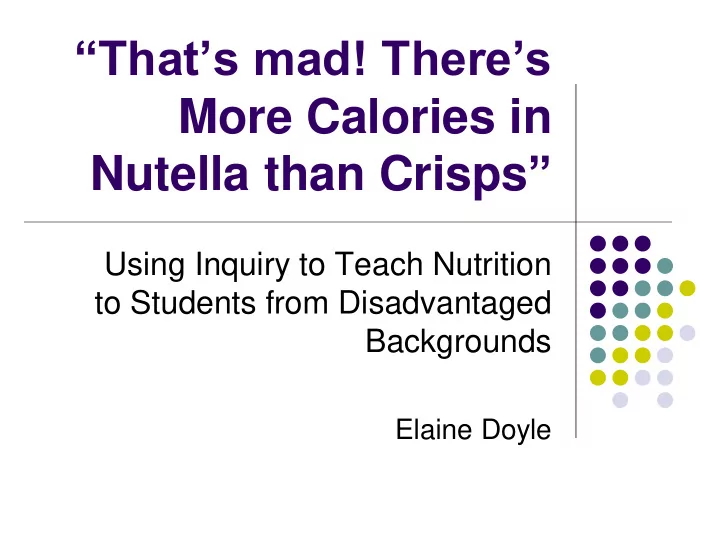

“That’s mad! There’s More Calories in Nutella than Crisps ” Using Inquiry to Teach Nutrition to Students from Disadvantaged Backgrounds Elaine Doyle
My Context A small, all-girls Urban DEIS school DEIS – “Delivering Equality In Schools”, it means “opportunity” in Irish DEIS schools are schools that have been designated disadvantaged by the Department of Education and Skills Characterised by learning and behavioural difficulties Multi-ethnic mix of students
My challenges Classroom practice not meeting pupil needs Relevance of Science syllabus to pupil needs Improvement needed in pupil behaviour motivation test scores
Inquiry Based Science Education IBSE Rocard Report, 2007 IBSE “…increases children’s interest in science learning activities” “… has been shown to have a positive impact on students’ attainments , with an even stronger impact on … those from disadvantaged backgrounds” “… girls participate more enthusiastically in the activities and develop a better level of self-confidence than with the traditional approaches to teaching science”
Overcoming challenges Enrolled in Amgen sponsored CPD, facilitated by CASTeL SAILS project Adaptation of suggested teacher resources Incorporation of higher order thinking skills into my practice – Bloom’s Taxonomy
Module - Investigating Food Food Cards (flashcards) Photograph with nutritional information on the reverse Designed to maximise the potential comparisons that could be made between foods
Module - Investigating Food The Washing Line String, two retort stands, pegs and a set of food cards A washing line made by suspending the string from the two retort stands
Food Card Student Activities In small groups, students: examined a small number of cards commented on any trends they could identify in the nutritional information provided for each food identified foods whose labels may give misleading or inadequate information justified their selections designed their own food labels to include all nutritional information that they thought was necessary
The Washing Line Activity Three groups - carbohydrate, energy, fats Hung their cards on the washing line in order From the lowest to the highest carbohydrate, energy or fats value Whole class Compared and commented on the order of the foods on each line Identified which nutrient, carbohydrate or fat, was responsible for the energy values of the selected foods Small Groups Identified junk foods on the washing lines and Defined what a junk food is
Formative Assessment Observation of students during activities Motivation and behaviour All Students: participated in the activities were on task for the duration of the activities were enthusiastic after initial prompting by teacher questions, classroom dialogue was driven by the students Peer observation by a science teacher* Critical dialogue on learning outcomes
Summative Assessment Written exam Immediately at conclusion of topic No significant difference in student test scores versus others taught in a more traditional, didactic manner End of term exam (6 weeks later) Students scored 20% higher (on average) on questions on the food module than they did on other topics
Conclusions “That’s mad! There’s More Calories in Nutella than Crisps ” Formative testing showed general improvements in pupil behaviour, motivation and attention in class Summative testing showed improved pupil learning, that was embedded over time (including end-of-year exam results) Is the improvement a one off?
Discussion 1 Inquiry based learning is difficult to assess – learning is so broad and unintended outcomes Remember that I began changing my pedagogy primarily to try to improve my students’ attitudes towards science – I need more quantifiable evidence of this Encouraging higher order thinking skills through IBSE can have ‘snowstorm’ of unintended learning outcomes Sharing our work is important – teacher learning
Discussion 2 Impact of inquiry based education on other teachers * “When I tried it out in my own classroom, it was fantastic ” IBSE (food) module suggestions focus on lower cognitive order thinking skills – need to use full range. Syllabus needs ‘space’ to make pupil learning more relevant. Effort needed More pleasant teaching and learning environment through inquiry base learning approach (initial aim of project)
Thank You! Elaine Doyle elaine_doyle@hotmail.com
Recommend
More recommend